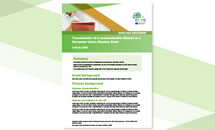Rapid Risk Assessment: COVID-19 outbreaks in long-term care facilities in the EU/EEA in the context of current vaccination coverage
Coronavirus disease (COVID-19) outbreaks in long-term care facilities (LTCFs) in European Union and European Economic Area (EU/EEA) countries have caused significant morbidity and mortality since the beginning of the COVID-19 pandemic. Hence, COVID-19 vaccination programmes prioritised residents of LTCFs as one of the main target groups for vaccination. Although morbidity and mortality in this population has dramatically declined with the progressive increase of vaccine uptake, several outbreaks continued to occur during 2021, coinciding with high levels of community transmission and incomplete vaccination of LTCF residents and staff.
The emergence of significantly more transmissible SARS-CoV-2 variants such as the B.1.617.2 (Delta) is causing an upsurge of COVID-19 cases in several EU/EEA countries. This is likely to continue until a larger proportion of the general population is fully vaccinated, unless more stringent non-pharmaceutical interventions (NPIs) are implemented. High levels of SARS-CoV-2 community transmission increase the risk of outbreaks in LTCFs and the risk of infection for unvaccinated or partially vaccinated vulnerable individuals. Furthermore, the population residing in LTCFs may also have altered (i.e. lower and shorter) vaccine protection due to their age and underlying conditions, albeit direct vaccine effectiveness data in this population is limited and data on vaccine effectiveness against the Delta variant of concern (VOC) specifically is missing. In addition, vaccine effectiveness against the Delta VOC in the general population is reduced compared to that against other variants, particularly following the administration of only one vaccine dose (for vaccines requiring a two-dose schedule).
Executive Summary
Risk assessed in this update
The assessment of the risk that SARS-CoV-2 currently poses to LTCF residents takes into account the epidemiological situations in the various EU/EEA countries and the vaccination status of LTCF residents (fully vaccinated versus partially vaccinated or unvaccinated). Due to the lack of reliable data on vaccination coverage among LTCF staff, we have assumed – based on the limited data available – that over 20% of LTCF staff are unvaccinated.
In countries with an epidemiological situation categorised as of very low or low concern, the risk posed by SARS-CoV-2 is assessed as low for fully vaccinated LTCF residents and moderate-to-high for partially vaccinated or unvaccinated LTCF residents.
In countries with an epidemiological situation classified as of moderate or high concern, the risk posed by SARS-CoV-2 is assessed as low-to-moderate for fully vaccinated LTCF residents and high-to-very high for partially vaccinated or unvaccinated LTCF residents.
Options for response
The overall level of SARS-CoV-2 transmission in the general population has a direct impact on the risk to LTCF residents; therefore, continued measures to maintain or reduce transmission in the general population will reduce the risk to this vulnerable group. More specific measures to reduce the impact of COVID-19 on individuals residing in LTCFs include:
- Rapidly ensuring full vaccination coverage of LTCF residents and all people in contact with them. COVID-19 vaccine uptake among LTCF residents (partially or not yet vaccinated), as well as healthcare personnel and other staff working in LTCFs, needs to be promoted further through specific activities targeting vaccine acceptance and barriers to uptake.
- Putting in place countermeasures to reduce the risk of virus introduction into LTCF communities.
- Ensuring early identification of COVID-19 cases in LTCFs, which is essential for the introduction of control measures and the prevention of further outbreak spread. Testing, contact tracing and investigation of COVID-19 cases and outbreaks in LTCFs (including whole genome sequencing (WGS)) should remain a priority for public health authorities.
- Maintaining meticulous compliance with NPIs for residents, staff and visitors in LTCFs, irrespective of vaccination coverage, while ensuring that the mental health needs of residents are taken into consideration.








